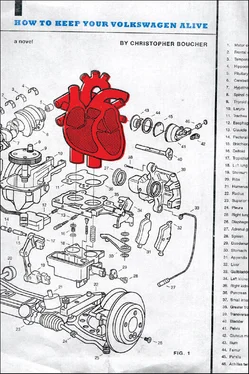“Alright,” I told him as I held him. “But you should know that I never planned it this way. Somehow my days turned soft. There is a limit to how many people you can hurt before it gets to you. And everything crosses over once you’ve been treed, and had a farm disappear on you with everything you care about inside it.”
“Not for me,” said the baby VW. “It is simple and beautiful.”
“You could get sick and die,” I said. “Cancer. Leukemia. A brain aneurysm. Sudden Volkswagen Death Syndrome.”
“Not every idea is for sharing,” he told me. “Just hold me and enjoy the marakesh that I am fresh and new, and I don’t have a dent on me yet.”
He was right. For once, I shut my mouth and my mind and focused on the new and untold story in my arms, such a gift! and when my new baby Volkswagen shivered I held him and pulled the blanket up to his chin.
TOOLS AND SPARE PARTS
If you want to keep your Volkswagen mandarin you’ll need a few tools. I’d recommend starting with the list below.
BioLegs, one pair (for those times when the VW is being repaired, is at school or is out with friends)
One Headless Syracuse, inner or placed
At least two spare memory coils
History-resistant wrenches (This is a must!)
Spare morning cables (various lengths)
Time (And not just any time — time you’re able to spend . How much depends on the car and the task, but you won’t get anywhere without at least a few years handy.)
Your Volkswagen will need constant repair. As confident and charged as my son was, for example, he always needed something. He was born with a cough and a limp and lesions on his skin, and he became exhausted easily, even at two or three years old. I learned early on that repairing him was not an occasion, but part of what it meant to parent this particular car. I don’t even want to think about the hours this took — between the finicky cylinders, a recurring coil problem and regularly-scheduled maintenance, at least a few mornings a week. And I remember spending a full day reading a complicated pedal chart just to change one cranky sustain.
You’ll make the coding that much more difficult for yourself, too, if you don’t have a quality set of tools. My melody on tools is that it’s absolutely worth going the extra hours for the good ones. You’ll see cheaper coats in the stores that speak the same language, but those few extra hours will get you a better attitude or emotional state. The cheaper tools are less optimistic, they don’t pray, they eat with their mouths open. Will they believe in the 1971 Volkswagen Beetle, the CityDogs, a story called Faces? I can’t guarantee it (Though it depends, in part, on how your believer’s set up.). I’ve had real corners with cheap tools, usually because they’re so fragile. Remember, you’re not just buying metal or mesh here — you’re accepting a history, a group of stories that will become part of everything they touch: you, your Volkswagen, your home (via the floor of the VW’s garage/room!).
I remember once, I was changing the tuning valve and harmony gauge on my Beetle — this was several months after the Lady from the Land of the Beans left, and by this point I was overwhelmed by the amount of work the VW required — with a ratchet that I’d bought at the flee bee in Hadley a few weeks earlier. As it turned out, the tool was very unstable. It had been overly chatty all afternoon — telling me about its wife, its kids, a few scrapes with the law — but late in the day it became scared . We were struggling with two stubborn bolts when I heard the ratchet start to weep uncontrollably — I could hear him sealing and I could feel the tears on my hand. I tried to ignore it and keep working, but when he continued to cry I pulled him out from underneath the car and asked him what was happening.
“I can’t — I can’t do this,” he confessed.
“Course you can,” I told him. “We’ll get it, buddy.”
“No, no,” the ratchet said. “This won’t work.”
“What won’t work?”
“This project. These bolts are thirty years old. Have you looked underneath the car? It’s old and rus—”
“This car is a newborn ,” I assured him.
“What?” he said. His eyes blinked furiously. “How can that be?”
“Listen,” I said. “Just calm down and focus. I’ll worry about the car’s well-being — you just concentrate on the job at hand.”
The wrench shook his head. “Maybe I’m sick,” he said, and he took off his glasses and rubbed his cast-iron eyes. “I might have a virus. Do I look sick? Do I feel cold to you?”
“You’re fine,” I said.
The wrench closed his eyes and shook his head.
“OK,” I said. “Let’s get back to work, alright?”
“I can’t.” He curled up in my hand. “I’m sorry,” he said.
“Hey,” I said. I tried to uncurl him. “Hey — hey, come on. Come on — there’s work to do!” I tried to pry him open but he hugged his knees to his chest.
No way was I losing a ratchet that I’d spent good minutes on to depression, so the next day I took him in to a therapist that the Lady from the Land of the Beans had been seeing before she left Northampton. I was sitting in the waiting room and booking with the VW (who’d stayed home from school that day, claiming he was ill) while the ratchet spoke to the therapist. But then the receptionist asked me to step into the therapist’s office. I left the VW in the waiting room chair. “Stay right here, alright?” I told him.
The VW, who was reading, nodded.
I scanned the room and noticed three jackals sitting across from the VW. They were whispering and laughing.
I leaned in and whispered to my son. “Hey,” I said.
“What,” he said, without looking up.
“What’s the rule about trusting strangers?” I said.
“I won’t go anywhere, OK?” the VW said at full volume. “God!”
I pinched his arm. “What did I say about that expression?”
“Alright,” the VW said.
“What did I say?”
“Alright, I’m sorry ,” the VW said, and he pulled his arm away.
I went into the office and there was the therapist, wearing a therapy machine on his face. Across from him sat the ratchet, sniffling and teary-eyed in his chair.
“I’m going to need to ask you some questions if it’s alright,” said the therapist. The therapy machine made his voice sound like a library.
“Sure,” I said. I sat down.
“Harold tells me that he’s been working with you to repair your son—”
“A seventy-one Beetle,” I said.
“Right,” said the therapist, and I could hear his machine storing my answer. “And the Beetle is … how old?”
“Still an infant — only a few months,” I said.
“The nineteen seventy-one car is your son, and he’s only a few months old?”
“Right,” I said.
The therapist nodded, and then he reached up and pressed a key on the machine on his face. Then he said, “And I understand you’ve also lost your father recently?”
I leaned forward. “Do we have to discuss that?”
“See?” the ratchet said.
“Well wait a moment,” the therapist said. “Mr. _____ — I don’t want to pry. I understand that you’re in mourning. I’m just wondering if there’s a connection between what happened—”
“I just said, I don’t want to talk about my father,” I said.
The therapist held up his hand and nodded slowly. “OK. Yes, I understand,” he said.
Then the ratchet began to sniffle and a tear ran down his cheek. The therapist turned to him. “Harold?” he said.
“Ask him about his project — about his son,” said the ratchet. “Ask him how he runs and where it goes—”
Читать дальше












